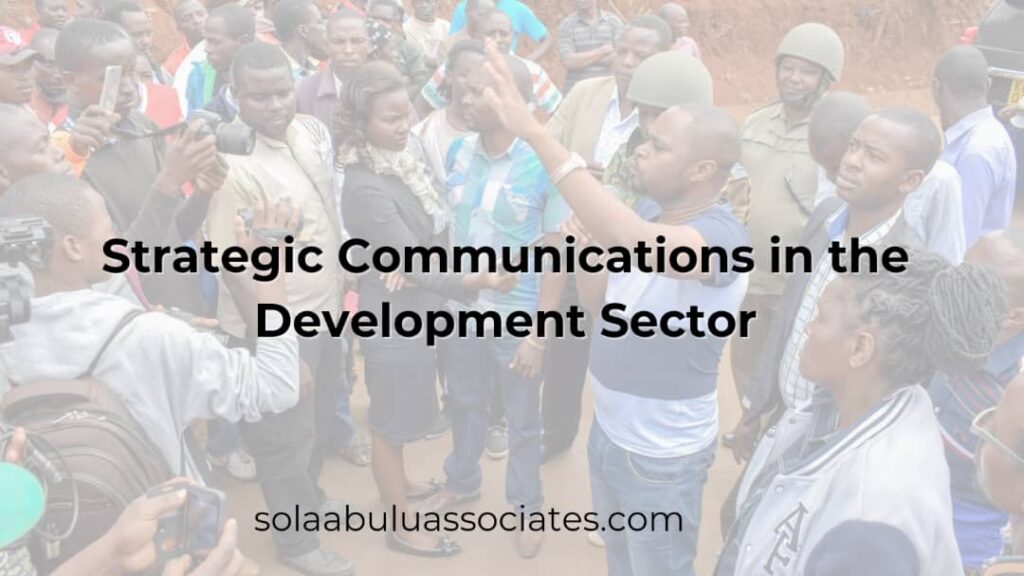Strategic Communications in the Development Sector

Employing the relevant communications framework is important for all business sectors. However, the goal of communications tends to differ depending on the sector involved. For instance, the aim of political communications differs from public sector policy communications. Strategic political communications the aim is to inform and influence citizens towards a political agenda. In contrast, public sector policy communications is involved in disseminating information about government policies and initiatives to the public effectively.
This article explains the importance of strategic communications for professionals in the development sector. Firstly, it is important to define key terms that will be discussed:
“ Strategic communications is defined as the purposeful use of communications to enable an organisation, business or institution to achieve their desired objectives. “
This means that in the development sector for example, if communications is purposeful, it has to have an intent and follow a step-by-step model to achieve the desired goal. Read more about strategic communications here.
A step-by-step approach to strategic development communications
- Organizational or institutional context:
In the development space, strategic communications begins with the broad context which is peculiar to the organizational or institutional goals. The context of development communications can be further broken into different kinds of organizations some of which includes Non governmental organizations, humanitarian organizations, policy-making organizations, etc. They often share a common goal depending on the context involved but as a whole, development communications is concerned with building and advocating for social development.
To know the organizational goal and strategic agenda at a given time, it is important to note what conversations the leadership is engaging in. This gives perspective to what matters per time. The communications effort can be described as strategic when it is fleshed out from and concerned with the overall organizational or institutional goals and agenda. Some examples of a strategic agenda in this sector are; to eradicate polio in a given community, to influence public sector policy, raise funds, etc. This step involves having conversations with the organizational leaders; however to be strategic, communications professionals can adopt global principles and employ local perspectives to help the audience’s understanding.
- Target Audience, stakeholder and beneficiary
In this stage, you clearly define the target audience, stakeholders and beneficiaries of the development agenda. These terms, although used interchangeably, can refer to different people. The audience are people you engage with both internally and externally, stakeholders are key players within the organizational system that should share similar objectives while beneficiaries are those you focus your development action on and monitor to measure success. In this stage, you map and profile both the stakeholders and beneficiaries to know the beliefs, values, interest, influence, etc.
This is a very key step in development communications for global organizations with a strategic agenda for different countries. It is important to know what makes an audience in a particular demography of geography different from another based on cultural beliefs, interests, influence, etc., to be able to communicate with them.
- Messaging and influencing strategy
Strategic communications in the development sector adopts the Behavioural Change Communications (BCC) model in its messaging. You will find this BCC model guidance framework document by the United Nations Development Programme (UNDP) useful.
With this model, you realize the enablers and blockers that is very likely to block one from achieving the desired strategy agenda. This is what guides the messaging strategy to achieve an outcome. Unlike in the business world and other sectors, here, discrete and intentional stakeholder engagement. The “Know, Feel and Do” concept also guides the messaging strategy, that is, what do you want them (your audience and beneficiaries), how do you want them to feel and what should they now do with the message?
- Implementation strategy
It is at this level that the communications channels for implementation are decided. Depending on the context, it could be on social media alone or social media and face-to-face. Often, in development communications, physical townhall meetings are advised for stakeholder management depending on the demography. Also, the content and delivery strategy, timing and sequence alongside the spokesperson to be used
- Metrics
At this level, success is measured from the communication efforts. It relies on the organizational or institutional level. To measure the performance, data from feedback forms, etc. There are usually specific targets from step 1 (organizational and institutional context) that informs the metrics for measurement and key performance indicators.
In development communications, it is very important to understand the state of things before the communications campaign, that is, knowing what your ground zero is, in order to determine success and see where the change has occurred. Unlike in the business world, this is more about underground delivery
- Sustainability
It is at this stage that the communications professionals have to note what their learnings are from the campaign in order to replicate it and improve upon it in other instances. This video will give you more insight on this stage.
Strategic communications in any sector has to be intentional and purposeful to achieve a desired outcome. However, the frameworks and models that guide communications in the development space are broader than the above-mentioned. To learn more, sign up for our upcoming strategic communications course this November.
………..
Sola Abulu & Associates is a strategy and communications consulting and training firm committed to enabling businesses, brands and organizations to achieve their objectives through strategic communications, organizational effectiveness and reputation risk management
Chat with us for more information on our courses.
